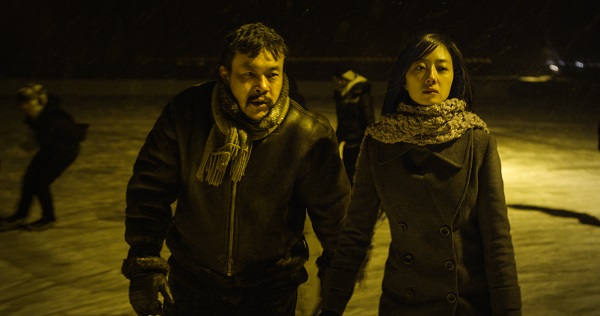Tribeca Reviews: A Chinese Crime Drama, Film Noir Style

“Black Coal, Thin Ice” premiered at the Tribeca Film Festival. Photo Credit: Production company — Omnijoi Media Corporation Co., Ltd.
A dismembered hand, half-buried in a pile of coal, beckons us into the sinister urban sprawl of Diao Yinan’s thrilling crime drama Black Coal, Thin Ice. The limb is one of several body parts cropping up in coal plants around one Northern Chinese province, and detective Zhang Zili (Liao Fan) dives headlong into an investigation of the serial murders. However, his badge is stripped after a mucked-up arrest (involving a cleverly staged shootout in a hair salon), and the lawman settles for a post as a security guard at a factory, entering into a cyclical bout of drunken nights and debilitating workplace hangovers. When fresh extremities turn up five years later, Zhang, in vigilante fashion, seeks to finish what he started, drawing him into a neo-noir mélange of cloak-and-dagger detective work and a bleak universe defined by moral ambivalence and neon lights.
Black Coal, Thin Ice is Yinan’s third directing credit, after Uniform (2003) and Night Train (2007), and pays a small homage to his debut film — unclaimed clothing items at a laundromat come to play paramount roles in both pictures. In the classic noir vein, the writer-director serves up an impressively intricate plot, but the linear conceit tends to skew convoluted — at times, it’s like cutting through a dense jungle of facts with a butter knife rather than a machete. Spot-on acting from the leads — Fan as the fallen-from-grace copper with a big chip on his shoulder, and Gwei Lun-Mei as the film’s femme fatale, unassuming laundry worker Wu Zhizhen — helps to balance out some of the murk. (Indeed, Fan hauled in the top acting prize for his nuanced portrayal of the intrepid antihero at this year’s Berlin Film Festival, where the flick made its world premiere — and won the festival’s Golden Bear award for best film.) Never mind Wu’s mysterious connection to the disassembled corpses — she’s a sedate seductress, and Zhang, whether due to her enigmatic aura or perhaps the lingering scent of mountain-fresh detergent, can’t stay away. The affair the duo eventually fling themselves into is ultimately nothing like the captivating rapport between Walter Ness and Phyllis Dietrichson in genre great Double Indemnity, but the double crossings and secret agendas that lace the relationship certainly tap into occasional intrigue-packed lodes.
Yinan and d.p. Dong Jinsong pull some creatively conceived camerawork out of their bag of tricks to tell the shadowy story, whether it be a motorcycle-mounted tracking shot taking us forward in time from 1999 to 2004, or an end-over-end free fall from the bed of a dump truck to replicate the POV of a tumbling body part. And Jinsong’s stylized cinematography of a dreary industrial Chinese winterscape provides an ominous flourish to the whole ordeal. Combined with composer Wen Zi’s understated score and the cranked-up sounds of the metropolis, the photography cuts to the film’s heart: a biting exposé on the languidness of contemporary working-class China, where pessimism abounds and people wield ice skates as deadly weapons. Indeed, an out-of-the-blue firework flourish is the only thing that potentially thaws the ice.
Rating: 3 out of 4 stars

